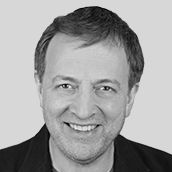
Misha Glenny is an award-winning journalist and a former BBC Central Europe Correspondent. He is the author of McMafia, now an Emmy-award winning TV drama, and DarkMarket: How Hackers became the New Mafia. He is a former UK Digital Security Journalist of the Year.
You’ll be hard-pressed to find any good news in Europe these days, as the Russian invasion of Ukraine has obscured almost everything else. The sweeping package of sanctions that the West has imposed on Russia has brought to a standstill much of the trade and collaboration between the two.
With Russian airlines banned from EU and UK airspace, and most European airlines cutting all travel to Moscow and St. Petersburg, there has been a massive reduction in traffic between West and East. Russia has not been entirely cut off though as flights still operate from several parts of the world, notably to and from China and India. These two countries’ airlines are also enjoying an advantage over their European and US competitors on long-haul flights as they continue to use Russian airspace.
A close reading of flight trackers, however, shows that there is still a significant market for private and charter flights between certain countries, such as Switzerland, and Moscow. On 27 February, for example, a Serbian carrier, Air Pink, scheduled three flights from Bern and Geneva to Moscow. This suggests that while the scope of EU and UK sanctions on Russian oligarchs remains unclear, businesses and wealthy individuals still have some outlets for travel between Russia and western Europe as do the sectors affected by financial sanctions, such as the gas trade between Germany and Russia, which remains very active. One eye-witness noticed that a week into the invasion of Ukraine, the Russian language still echoed around the slopes of the world’s ski capital Courchevel as its speakers arrived by helicopter and private jet.

While Russians face new challenges getting into Europe, Ukrainians are arriving in large numbers — a staggering three million had fled in less than three weeks. According to the United Nations High Commission on Refugees, Ukraine’s refugee crisis is the largest movement of people on the planet since the second world war. Another three to four million Ukrainian refugees are expected to follow. Much of Europe’s transport infrastructure will now be devoted to managing the distribution of these refugees across Europe. The main recipients in the first instance, Poland, Slovakia, Hungary, Romania, and Moldova are ill-equipped to absorb this huge surge. Other countries are already stepping up to the plate. The Czech Republic is diverting many of its trains to southern Poland to lay on free travel for Ukrainians to Brno, Prague, and other cities.
The Ukrainian crisis will dominate issues of mobility for many months to come, especially in Scandinavia, Central Europe (including Germany), and down into the Balkans. This monumental drama has obscured any good news that has recently emerged from the continent. At any other time, the retreat of Covid from its status as a deadly pandemic to an endemic, but manageable, virus would be a hugely significant development.
The EU and the UK have both managed the transition from Delta to Omicron reasonably well. Even though rules within the EU differ from country to country, travel within the bloc is experiencing a rapid surge. Equally, long-haul travel between the major European hubs, including London, and the USA, Asia, Africa, and South America are showing steady increases.
More cautious voices from the World Health Organisation and the science research community in Europe and the UK still warn against the emergence of new Covid-19 variants that could yet prove as virulent as Omicron but with lower rates of fatality or serious long-term illness. “The Omicron variant did not come from the Delta variant”, explained Prof. Mark Woolhouse of Edinburgh University in the Guardian. “It came from a completely different part of the virus’s family tree. And since we don’t know where in the virus’s family tree a new variant is going to come from, we cannot know how pathogenic it might be. It could be less pathogenic but it could, just as easily, be more pathogenic,” he said.
Nonetheless, moving around western and southern Europe these days feels relatively normal — although it’s always worth keeping your triple-vax certificate and a supply of masks with you wherever you go. In the coming months, it is inflation and rocketing fuel costs that are likely to prove a major deterrent to people from getting out and about again.
The final major issue regarding mobility concerns supply chains and trade. Both the EU and the UK have committed themselves to the most ambitious zero-emission programs in the world. Much of this depends on the switch to electric vehicles. Yet even at this stage, that shift is slower than was hoped for. Supply chain issues post-pandemic, especially in the electronic chip industry, have led to deliveries of new electric vehicles backing up for months on end. This is especially acute in the UK, where the growing amount of red tape separating Britain from Europe — due to Brexit — is exacerbating supply chain issues in every sector. This has been most visible in supermarkets, where fruit and vegetable shelves across the country are frequently half-empty.
So, what looked like it was going to be a dynamic spring in Europe has been hit by a severe frost from the East. The Ukrainian crisis has not only drawn an enormous question mark over the direction of travel in Europe for months —and even years — to come, it has cast a dark shadow over the whole world.